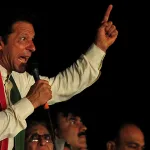LAHORE, Pakistan: The Federal Minister for Railways Khawaja Saad Rafique said on Thursday that the framework agreement for investment of Rs 1,000 billion on upgradation of PR’s Main-Line (ML-1), signed with China was a big breakthrough for the Railways.
While addressing a press conference at the Pakistan Railways (PR) headquarters in Lahore, he said that these funds would be spent on upgradation of Peshawar to Karachi track, PR Walton Academy Lahore, and upgradation of Havelian Container Terminal.
The minister said that this investment would transform the railways, and the people of Pakistan would see a new railways in near future.
The railways minister said that under this agreement, the ML-1 track would be upgraded for speed of 160 km/hour, double track would be laid, fencing would be installed in populated areas along the track, automatic modern signaling system would be introduced for accident-free travelling, new locomotives of 160 km/hour speed would become part of the railways.
Saad Rafique said that work on this project would be started in the current year while a project management consultant (PMC) would be appointed to monitor the project and its progress.
“We did not accept Chinese as the PMC and an impartial consultant would be appointed after international and transparent bidding,” he added.
The minister declared the Pakistani delegation’s visit to China along with all four chief ministers under the leadership of Prime Minister Nawaz Sharif as fruitful and successful.
“We attended the One-Road-One-Belt (OROB) seminar and signed several agreements and MoUs,” he said.
“It was a beautiful scene for the nation that all chief ministers and several federal ministers jointly participated in the activities for development of the country without any political differences,” he added.
“We represented the country by joining hands which shows politicians can move forward without any differences,” he said.
The minister congratulated the prime minister for the successful visit.
Saad Rafique thanked the Pakistan Army and its Organisation, Frontier Works Organisation (FWO) and said that all institutions are working with the PR and the engineers of the Pak Army Signals Department had developed a modern signaling system for level crossings.
The minister said that the Railways earned Rs 36 billion in the previous year, and it is expected to earn Rs 41 billion this year. The Railways revenue is likely to reach Rs 53 billion in future, he added.
The railways minister said that the PR spends 74 percent of its income on pay and pension, 16 percent on fuel, while only 10.5 percent is spent on the entire railways.
The minister said that the PR was working with provinces for mass transit projects in provincial capitals and work on restoration of Karachi Circular Railways was in progress.
“Peshawar Mass Transit Railways was also under consideration and the federal government is working with the provincial governments on it,” he added.
To a question, the minister said that development in China is unmatched in the world and the OBOR is very important, adding that the prime minister took a right initiative and signed the China-Pakistan Economic Corridor (CPEC) agreement with China.
The minister said that the world was changing, and China was playing a leading role in it. He called upon all stakeholders including the media, businessmen, officers and common people to play their role in making CPEC a success as it would be beneficial for the next generations.
“CPEC is flagship project of the OBOR,” he said adding that “critics should visit China to see what is development and how the country is building roads and communication networks.”
To a question, the minister said that Pakistan has persuaded China to extend long-term most favourable loan for Pakistan, adding that it was an effort of the delegation that mark-up might not go beyond two percent rate on these projects.
The minister made it clear that the investment is only for the ML-1 and it would be for five to six years time period, adding that the PR needs 30-35 billion US dollars for complete transformation.
To another question, he said that the world knows that development of the country was dependent on development of railways, seaports, roads, airways, internet and pipelines but some elements made fun of the vision of the prime minister when he started the development process in 1990.





